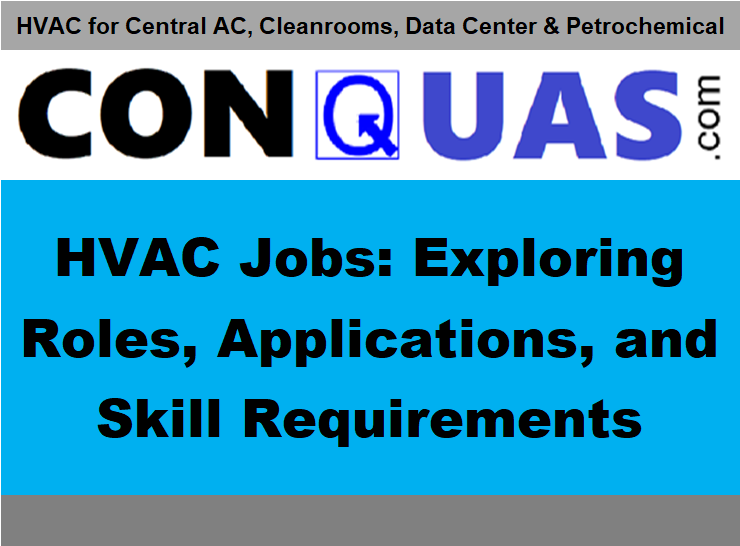HVAC Jobs | Exploring the Roles, Applications, and Skill Requirements
Welcome to the world of HVAC jobs, where heating, ventilation, and air conditioning converge to create comfortable indoor environments. In this comprehensive guide, we’ll delve into the various facets of HVAC jobs, from their roles and applications to the skills required and the latest industry developments. Whether you’re aspiring to join this dynamic field or seeking to expand your knowledge, you’re in the right place. Let’s embark on a journey through the exciting realm of HVAC jobs.
Understanding HVAC Jobs and Their Role
HVAC, which stands for heating, ventilation, and air conditioning, encompasses a range of job roles dedicated to creating and maintaining optimal indoor climates. These professionals play a crucial role in ensuring comfortable temperatures, adequate airflow, and high indoor air quality in residential, commercial, and industrial spaces. The role of HVAC jobs includes:
- Installation, maintenance, and repair of HVAC systems
- Designing energy-efficient HVAC solutions
- Performing inspections and diagnostics
- Collaborating with other professionals on construction projects
- Ensuring compliance with codes and standards
Applications of HVAC Jobs
HVAC jobs find applications in a wide array of industries and settings:
- Residential: HVAC professionals ensure comfortable living conditions in homes by installing and maintaining heating and cooling systems.
- Commercial: They create pleasant environments in offices, retail spaces, and hospitality establishments, optimizing conditions for occupants and customers.
- Industrial: HVAC systems are vital in manufacturing facilities to regulate temperature and air quality for both products and workers.
- Healthcare: Hospitals and healthcare centers rely on precise HVAC systems to maintain sterile environments in operating theaters and patient rooms.
- Data Centers: HVAC experts design systems that efficiently cool data centers, preventing equipment overheating and ensuring optimal performance.
Types of HVAC Jobs
HVAC jobs encompass a variety of specialized roles:
- HVAC Technician
- HVAC Engineer
- HVAC Installer
- HVAC Maintenance Specialist
- Energy Efficiency Consultant
- Building Automation Specialist
- Indoor Air Quality Technician
Advantages & Disadvantages of HVAC Jobs
Like any career path, HVAC jobs have their pros and cons:
Advantages:
- Steady Demand: HVAC systems are essential, ensuring a consistent demand for skilled professionals.
- Varied Opportunities: HVAC jobs span across multiple sectors, providing diverse career paths.
- Job Security: Skilled HVAC professionals are always in demand, offering job stability.
- Hands-On Work: These roles often involve practical, hands-on tasks, appealing to those who enjoy tangible work.
Disadvantages:
- Physical Demands: HVAC work can be physically demanding, requiring manual labor and working in various conditions.
- Complex Systems: HVAC systems are intricate, necessitating continuous learning and skill development.
- Environmental Impact: HVAC systems contribute to energy consumption and emissions, posing sustainability challenges.
- Challenging Environments: Some assignments may involve working in confined spaces or extreme conditions.
LATEST DEVELOPMENTS IN HVAC Jobs
The HVAC industry is evolving with cutting-edge technologies and trends:
- Smart HVAC Systems: Integration of IoT technologies for remote monitoring and energy optimization.
- Energy Efficiency: Emphasis on sustainable solutions to reduce energy consumption and carbon footprint.
- Green HVAC: Implementation of eco-friendly refrigerants and systems to mitigate environmental impact.
- Automation: Integration of AI and automation for intelligent HVAC control and predictive maintenance.
Codes & Standards in HVAC Jobs
The HVAC industry adheres to various codes and standards to ensure safety and performance:
- ASHRAE Standards 62.1
- Energy Conservation Building Code (ECBC)
- Indian Green Building Council (IGBC) Standards
- Current Good Manufacturing Practices (cGMP)
- ISO 14644-1
Companies Offering HVAC Jobs
Several prominent companies provide opportunities in the HVAC field:
- Carrier Corporation
- Daikin Industries
- Johnson Controls
- Trane Technologies
- Honeywell
Skills and Educational Requirements for HVAC Jobs
Key skills and qualifications for success in HVAC jobs include:
- Technical expertise in HVAC systems
- Knowledge of energy-efficient practices
- Understanding of codes and regulations
- Problem-solving and diagnostic skills
- Effective communication and teamwork
Education in HVAC engineering, mechanical engineering, or related fields is often required. Certifications from organizations like ASHRAE and IGBC can enhance your credibility.
Preparing for HVAC Jobs
To excel in HVAC jobs:
- Acquire relevant education and certifications
- Stay updated with industry trends
- Build hands-on experience through internships or apprenticeships
- Hone soft skills like communication and problem-solving
Developing Soft Skills for HVAC Jobs
Soft skills are invaluable in HVAC careers:
- Communication: Explain technical concepts to non-experts.
- Customer Service: Interact professionally with clients and colleagues.
- Problem-Solving: Troubleshoot issues efficiently.
- Attention to Detail: Ensure precision in installations and repairs.
- Time Management: Juggle multiple tasks effectively.
Skillset Checklist for HVAC Jobs
Ensure you possess these essential skills:
- Technical proficiency in HVAC systems
- Knowledge of building codes and regulations
- Ability to read and interpret blueprints
- Understanding of energy-efficient practices
- Diagnostic and problem-solving skills
Educational Background for HVAC Jobs
Relevant educational paths include:
- Bachelor’s in HVAC Engineering
- Bachelor’s in Mechanical Engineering
- Diploma or Certification in HVAC Technology
Related Services Knowledge for HVAC Jobs
Proficiency in related areas, such as electrical systems, plumbing, fire protection and automation, can enhance your capabilities in HVAC roles.
Electrical Scope of Knowledge for HVAC Jobs
Basic electrical knowledge is essential:
- Understanding electrical circuits and components
- Safe handling of electrical equipment
- Troubleshooting electrical issues
Popular Training Institutes for HVAC Jobs
Enhance your skills through reputable training centers:
- Institute of HVAC Engineers
- ASHRAE Learning Institute
- Refrigeration and Air Conditioning Training Institute (RACTI)
Conclusion
Embarking on a career in HVAC jobs offers exciting opportunities to shape indoor environments and contribute to sustainability. From creating comfortable spaces to integrating cutting-edge technologies, HVAC professionals are at the forefront of enhancing the way we live and work. By honing technical skills, developing soft skills, and staying updated with industry advancements, you can thrive in this dynamic field and make a meaningful impact.

Leave a Reply